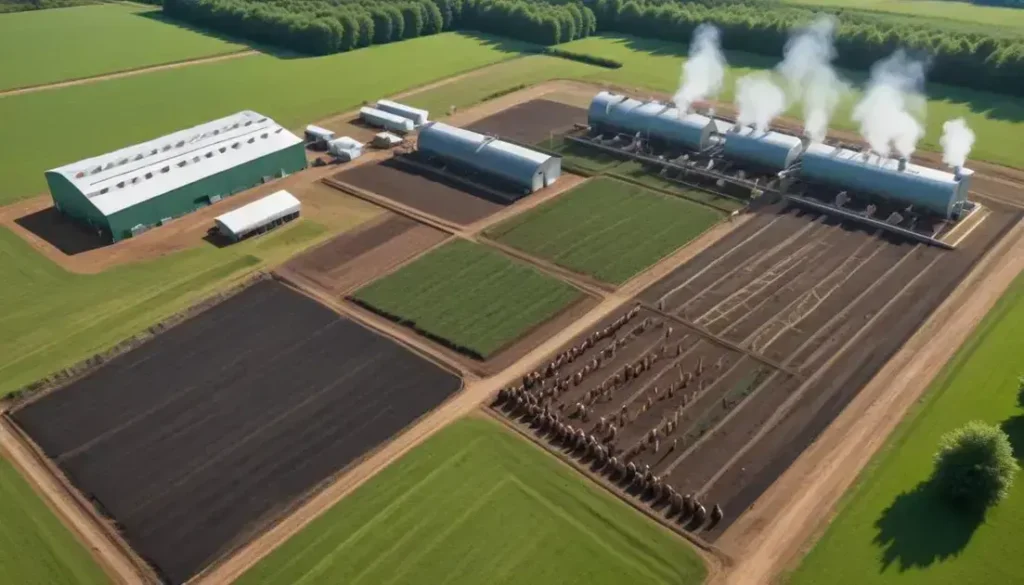The UK-India trade deal enhances opportunities for UK businesses by reducing tariffs, improving market access, and fostering collaboration in sectors like renewable energy, ultimately driving economic growth and sustainable development.
The recent UK-India trade deal promises a significant boost for the UK’s renewable energy industry, opening doors for UK-India Trade Deal partnerships. What does this mean for British businesses?
Introduction to the UK-India trade deal
The UK-India trade deal represents a pivotal moment in enhancing bilateral relations, particularly in the realm of renewable energy. This agreement is anticipated to unlock several economic opportunities for both nations. By fostering collaboration on clean technologies, the deal aims to address pressing global challenges such as climate change.
One of the main focuses is the potential for investment in renewable energy infrastructure. The UK, with its cutting-edge technology and expertise, can support India’s ambitious targets for sustainable energy. This collaboration could significantly increase the deployment of solar and wind energy solutions.
In addition to infrastructure, the trade agreement also seeks to create a more conducive environment for UK businesses entering the Indian market. Reduced tariffs and streamlined regulations will provide UK exporters an easier pathway to capitalize on the rapidly growing demand for sustainable products in India. This transition highlights a mutual benefit as both countries strive for sustainable economic growth.
Furthermore, the trade deal fosters a knowledge-sharing initiative that allows both nations to learn from each other’s best practices. Such initiatives not only strengthen economic ties but also lead to innovation in clean technology that can be beneficial worldwide.
Impact on UK’s renewable energy sector
The impact on the UK’s renewable energy sector is poised to be substantial following the UK-India trade deal. This agreement prioritizes collaboration in sustainable energy technologies, opening doors for innovative partnerships.
With India’s growing demand for clean energy solutions, UK firms are presented with a unique opportunity to leverage their advanced technologies. Investment in renewable energy infrastructure, such as wind and solar farms, will likely accelerate, benefiting both nations economically and environmentally.
Furthermore, the trade deal encourages research and development initiatives, enabling British companies to showcase their expertise in energy efficiency. As these firms engage in joint ventures, they not only gain access to India’s vast market but also contribute to global sustainability efforts.
The agreement facilitates knowledge sharing, which is crucial for the evolution of both countries’ energy strategies. By collaborating on clean technology projects, the UK and India can develop robust solutions addressing climate change while enhancing energy security.
Additionally, the reduction of trade barriers and tariffs within the context of the deal will promote quicker and more cost-effective transactions. This will invigorate the UK renewable energy sector and further align both countries towards achieving their climate goals.
Opportunities for UK exporters
The opportunities for UK exporters under the new UK-India trade deal are significant. With the Indian market expanding and increasing its focus on sustainable practices, UK businesses can play a vital role in meeting this demand.
This trade agreement facilitates easier access to India’s vast consumer base, especially in sectors like renewable energy, infrastructure, and technology. UK exporters can envision an influx of orders as they introduce innovative and high-quality products to Indian clients.
Moreover, the reduction of tariffs and regulatory barriers will make it more feasible for UK companies to establish a presence in India. This includes not only selling products but also engaging in joint ventures and partnerships with Indian firms. Such collaborations can enhance the competitiveness of UK entities, as they tap into local market knowledge and distribution networks.
Additionally, the agreement promotes regulations that support businesses engaged in clean energy projects. UK manufacturers and service providers specializing in green technologies can find unique niches in India’s growing commitment to sustainability.
As UK exporters explore these opportunities, they should remain agile, ready to adapt to the evolving market dynamics in India. Emphasising adaptability and innovation will ensure that they can respond effectively to the needs of the Indian market, thus fostering long-term growth and success.
Collaboration on clean technology
Collaboration on clean technology between the UK and India is set to reshape the energy landscape significantly. This partnership brings together the UK’s advanced engineering capabilities and India’s ambitious renewable energy targets, fostering innovative solutions to global challenges.
The trade deal encourages joint research and development efforts, which are crucial for creating new technologies that enhance energy efficiency. By pooling resources, both countries can accelerate the deployment of sustainable energy systems, such as solar and wind power.
Furthermore, the collaboration extends to critical areas like carbon capture and storage, which can help mitigate greenhouse gas emissions. With the UK’s experience in clean tech and India’s vast market potential, this synergy can lead to significant advancements in combating climate change.
Through knowledge sharing and expertise exchange, companies from both nations can innovate more effectively. UK firms can assist Indian counterparts in developing smart grids and energy storage solutions, while Indian firms can provide insights into rapidly scaling up renewable projects.
Additionally, this collaboration will likely boost job creation and economic growth in both countries. As clean technologies gain traction, they can drive sustainable development and support the transition toward a lower-carbon economy.
Investment in renewable energy infrastructure
Investment in renewable energy infrastructure is crucial for the sustainable development of both the UK and India. The recent trade deal fosters significant financial opportunities aimed at enhancing energy efficiency and sustainability in both nations.
As India continues to push towards its ambitious renewable energy goals, the UK is well-positioned to contribute its expertise and technologies. Investments in solar farms, wind turbines, and battery storage systems are expected to surge, creating a resilient energy framework that can meet increasing demands.
Moreover, public and private sectors in the UK are encouraged to collaborate with Indian counterparts through joint ventures. This approach not only amplifies funding available for infrastructure projects but also facilitates the exchange of innovative practices and methodologies in renewable technology.
Such investments can lead to substantial job creation, boosting local economies while addressing global sustainability targets. Enhanced renewable infrastructure in India can help reduce dependency on fossil fuels, aligning with international climate commitments.
Additionally, the financial backing for clean energy projects is expected to attract foreign direct investment, stimulating further growth in the sector. This dynamic relationship will ensure that both countries can lead in the adoption of green technologies, setting a benchmark for global sustainable practices.
Changes in tariff structures for British firms
Changes in tariff structures for British firms as a result of the UK-India trade deal present new opportunities for enhancing trade flows between the two nations. The revision of tariffs aims to simplify the process for UK exporters looking to enter the Indian market.
One significant aspect is the reduction in tariffs on a variety of goods, particularly in sectors such as renewable energy, textiles, and technology. This makes British products more competitive, allowing firms to offer better prices to Indian consumers and businesses.
Additionally, the agreement seeks to eliminate certain non-tariff barriers that have historically hindered trade. By addressing issues such as customs procedures and regulatory approvals, British firms can expect faster access to the Indian market. This efficiency will encourage more businesses to consider India as a viable destination for their exports.
The changes in tariff structures not only enhance market access but also provide an incentive for British firms to innovate and meet the specific demands of Indian consumers. Firms that can adapt their products and services accordingly will find themselves in a more favourable position.
Overall, these adjustments in tariffs are designed to promote a more balanced trade relationship, stimulating growth and enhancing the competitive standing of British firms in the Indian market.
Sustainable development commitments
Sustainable development commitments are at the core of the UK-India trade deal, reflecting a shared vision for a greener future. Both nations aim to tackle pressing environmental challenges through collaborative efforts in renewable energy, sustainable agriculture, and eco-friendly technologies.
The agreement places a strong emphasis on the need for sustainable practices across various sectors. This includes enhancing energy efficiency, reducing carbon footprints, and promoting circular economy initiatives. UK firms, known for their cutting-edge green technologies, are uniquely positioned to assist India in achieving its sustainability goals.
Moreover, the deal encourages investments in clean energy projects that align with international climate commitments. With India aspiring to increase its renewable energy capacity significantly, the commitment to sustainable development fosters a conducive environment for UK businesses to participate in this transformation.
Joint initiatives focused on research and innovation will further solidify the partnership. These efforts are designed to enhance knowledge sharing on best practices and successful implementations of sustainable systems. By working together, both countries can learn from each other’s experiences and accelerate the adoption of effective strategies.
Ultimately, the sustainable development commitments within this trade agreement not only promote environmental stewardship but also contribute to economic growth and stability, ensuring a prosperous future for both nations.
Knowledge-sharing initiatives
Knowledge-sharing initiatives play a vital role in enhancing collaboration between the UK and India, particularly in the context of the UK-India trade deal. These initiatives are designed to foster innovation and improve understanding of sustainable practices in various sectors.
Both countries bring unique strengths to the table; the UK is known for its advanced technologies, while India has a wealth of experience in scaling sustainable solutions. By pooling this expertise, the collaboration will facilitate the development of practical applications in fields such as renewable energy and environmental management.
These partnerships may involve joint workshops, seminars, and exchange programs that allow professionals and researchers to share insights and methodologies. This infrastructure for engagement contributes to a richer understanding of differing market dynamics and regulatory frameworks. As a result, businesses can better navigate challenges and explore new opportunities.
Furthermore, these initiatives can help create a vibrant ecosystem that inspires startups and established firms alike to innovate and push the boundaries of sustainability. By sharing best practices and lessons learned, both nations can accelerate their progress towards meeting climate goals and enhancing economic resilience.
Ultimately, knowledge-sharing initiatives not only promote mutual growth but also reinforce the shared commitment to building a greener and more sustainable future.
Future prospects for UK-India relations
The future prospects for UK-India relations look promising, particularly in light of the recent trade deal. This agreement paves the way for enhanced collaboration across various sectors, driven by mutual interests in sustainability, technology, and economic growth.
One key area of focus is the continued investment in renewable energy. Both countries aim to strengthen their positions as leaders in green technology, making it a cornerstone of their partnership. This collaborative effort will not only benefit their economies but also contribute significantly to global climate goals.
Additionally, the trade deal fosters innovation through knowledge-sharing initiatives, allowing businesses to collaborate on research and development projects. Such partnerships are likely to unlock new technological advancements and solutions tailored to both markets.
Moreover, as global dynamics shift, the UK and India can leverage their strategic relationship to enhance trade routes, ensuring better access to each other’s markets. This evolving economic landscape will play a crucial role in shaping the future of UK-India relations, creating opportunities for growth and prosperity.
In summary, as both nations prioritize collaboration, the future is bright for UK-India relations. Together, they can navigate challenges and seize opportunities, setting a robust foundation for a sustainable and innovative partnership.
Conclusion and call to action
The UK-India trade deal opens up a myriad of opportunities that can transform both economies significantly. By fostering collaboration in areas such as renewable energy, technology, and sustainable practices, both nations stand to benefit immensely. Engaging in this partnership allows for shared expertise and innovative solutions to pressing global challenges.
As businesses in the UK look to expand into the Indian market, it is essential that they embrace the changes associated with this trade agreement. This includes understanding the revised tariff structures and taking advantage of new investment opportunities. Companies should not only focus on immediate gains but also consider long-term strategies that align with sustainable development goals.
To fully harness the potential of this trade deal, it is crucial for stakeholders—business leaders, policymakers, and entrepreneurs—to come together and actively pursue collaborative initiatives. By participating in knowledge-sharing programs, joint ventures, and innovative projects, they can drive growth and create a positive impact on the global stage.
This is a pivotal moment for UK-India relations. Engaging in this partnership can lead to substantial advancements in sustainability and economic resilience. Join the movement towards a brighter, more sustainable future through collaborative efforts today.
In conclusion, the UK-India trade deal opens new avenues for growth
The UK-India trade agreement encourages collaboration in various sectors, such as renewable energy and technology. This partnership allows both countries to leverage their strengths, leading to innovative solutions for pressing challenges.
Businesses in the UK have a unique opportunity to expand into the Indian market, taking advantage of favourable tariff structures and investment opportunities. By working together, UK and Indian firms can create sustainable practices that benefit both economies and the environment.
Moreover, active participation in knowledge-sharing initiatives and joint projects will drive growth and set an example on the global stage. As both nations commit to a greener future, stakeholders will find valuable prospects for success.
Now is the time for businesses to engage in this partnership and embrace the potential for sustainable economic growth.
Frequently Asked Questions
What are the key benefits of the UK-India trade deal?
The UK-India trade deal offers various benefits, including reduced tariffs, enhanced market access, and opportunities for collaboration in sectors such as renewable energy and technology.
How can UK businesses take advantage of this trade agreement?
UK businesses can leverage the agreement by exploring new markets in India, adapting their products to meet local needs, and engaging in joint ventures and knowledge-sharing initiatives.
What role does renewable energy play in the trade deal?
Renewable energy is a significant focus of the trade deal, promoting investments and collaborations between the UK and India to advance sustainable practices and technologies.
Are there specific sectors that will benefit the most from this trade agreement?
Sectors such as renewable energy, technology, and sustainable agriculture are expected to benefit greatly from the trade deal, fostering innovation and economic growth.
What impact will the deal have on sustainable development?
The trade agreement supports sustainable development by encouraging environmentally friendly practices and fostering partnerships that aim to tackle climate change and promote green technologies.
How can knowledge-sharing initiatives enhance UK-India relations?
Knowledge-sharing initiatives can strengthen UK-India relations by enabling the exchange of best practices, fostering innovation, and improving understanding of each market’s needs and opportunities.


